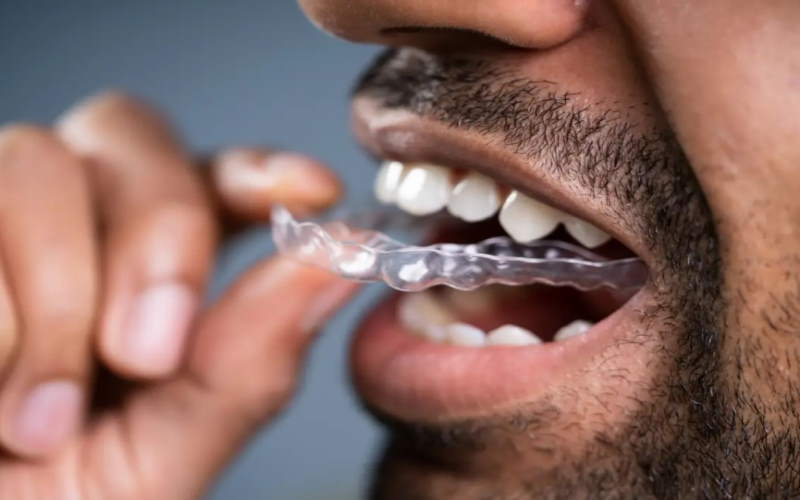Pregnancy brings numerous changes to the body, including hormonal fluctuations that can exacerbate teeth grinding or bruxism. For expectant mothers, seeking Teeth Grinding Treatment In Dubai requires careful consideration to ensure both maternal and fetal safety. While untreated bruxism can lead to jaw pain, headaches, and tooth wear, it’s essential to explore treatment options that do not interfere with pregnancy. Understanding safe interventions, lifestyle adjustments, and dental care strategies can help manage symptoms effectively.
Understanding Teeth Grinding During Pregnancy:
Hormonal and physical changes during pregnancy can increase the likelihood of bruxism.
-
Elevated stress and anxiety may trigger nighttime grinding
-
Swelling and jaw tenderness are common and can worsen bruxism discomfort
-
Sleep disturbances often intensify grinding episodes
-
Awareness of grinding symptoms helps prevent long-term dental damage
-
Early consultation with a dentist ensures safe and effective treatment options
Consulting a Healthcare Professional:
Collaboration between dental and prenatal care providers is critical.
-
Dentists can recommend pregnancy-safe interventions
-
Obstetricians can review medications or supplements to avoid any risks
-
Multi-disciplinary care ensures maternal and fetal safety
-
Professional guidance helps in choosing non-invasive approaches
-
Early assessment prevents complications such as enamel wear or jaw pain
Safe Dental Devices for Pregnant Women:
Night guards and protective appliances are often the first line of treatment.
-
Custom-fitted night guards prevent tooth damage and reduce jaw strain
-
Over-the-counter options may be considered with professional guidance
-
Devices should be made from non-toxic, biocompatible materials
-
Proper fit ensures comfort and does not interfere with oral hygiene
-
Regular monitoring ensures the device continues to function effectively throughout pregnancy
Stress Management and Relaxation Techniques:
Reducing stress is a key component of managing pregnancy-related bruxism.
-
Deep breathing exercises and meditation alleviate nighttime clenching
-
Prenatal yoga supports relaxation and reduces overall muscle tension
-
Journaling or therapy helps address emotional stressors
-
Adequate sleep and consistent routines improve restorative sleep quality
-
Combining relaxation techniques with dental protection enhances overall outcomes
Safe Medications and Therapies:
Pharmacological interventions are generally limited during pregnancy.
-
Muscle relaxants are rarely prescribed and only under strict supervision
-
Topical pain relief, such as safe gels or warm compresses, may relieve jaw soreness
-
Avoid medications not cleared by an obstetrician due to fetal risks
-
Non-invasive therapies are prioritized to manage severe symptoms
-
Close monitoring ensures maternal comfort without compromising safety
Lifestyle Adjustments to Minimize Grinding:
Simple daily habits can significantly reduce bruxism during pregnancy.
-
Avoid caffeine, especially in the afternoon and evening
-
Limit chewing gum or hard foods that increase jaw strain
-
Practice gentle jaw stretches to alleviate tension
-
Maintain consistent sleep schedules and a calm bedtime routine
-
Healthy diet and hydration support overall oral and systemic health
Monitoring Progress and Adjusting Treatment:
Pregnancy requires ongoing evaluation to adapt treatments safely.
-
Regular dental checkups ensure protection against tooth wear or damage
-
Night guard adjustments may be needed as swelling or oral changes occur
-
Tracking stress levels and sleep quality helps refine behavioral strategies
-
Multi-disciplinary feedback ensures treatments remain safe for mother and baby
-
Continuous evaluation prevents complications and ensures comfort throughout pregnancy
Final Thoughts:
Managing teeth grinding during pregnancy requires a careful balance of safety and effectiveness. Teeth Grinding Treatment In Dubai offers multiple options, but expectant mothers must prioritize non-invasive interventions, stress management, and professional guidance. By combining dental devices, relaxation techniques, and lifestyle adjustments, it is possible to protect teeth, reduce jaw discomfort, and maintain restful sleep without risking fetal health. Early consultation and ongoing monitoring ensure that treatment is tailored, safe, and effective, allowing mothers to focus on a healthy pregnancy while managing bruxism symptoms.







0 Comments